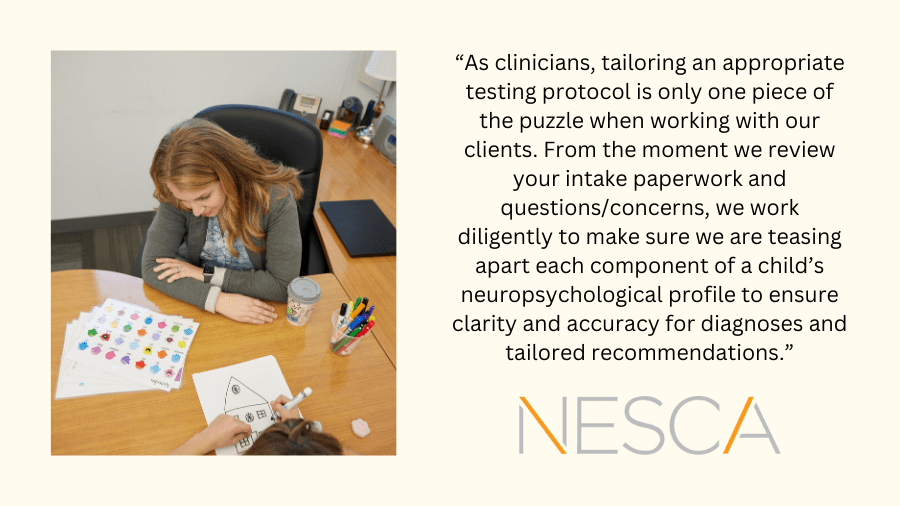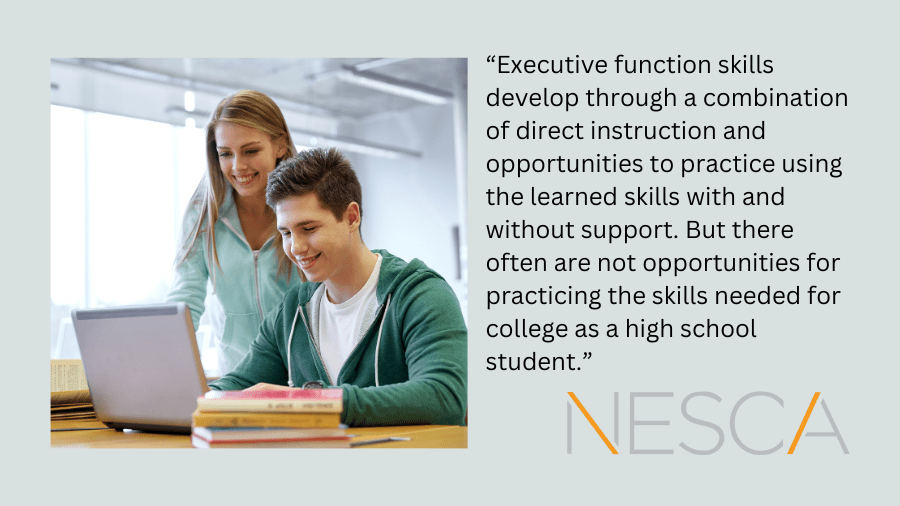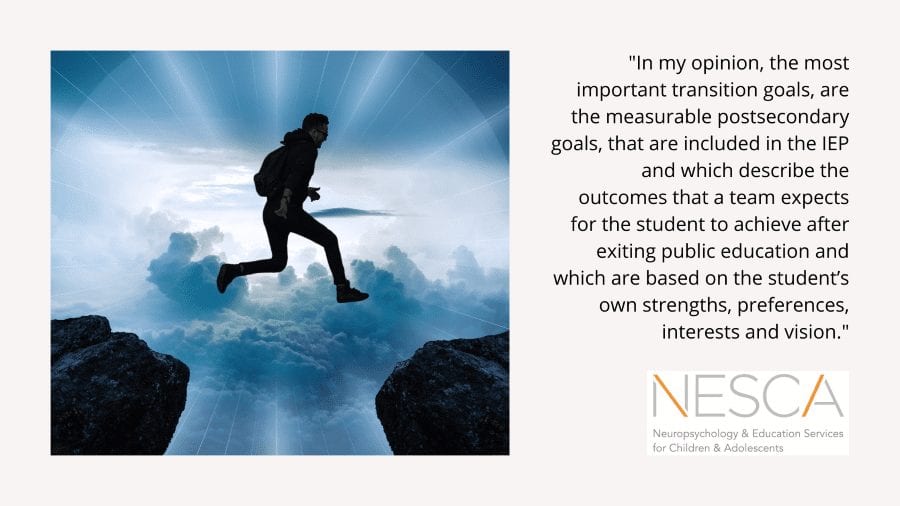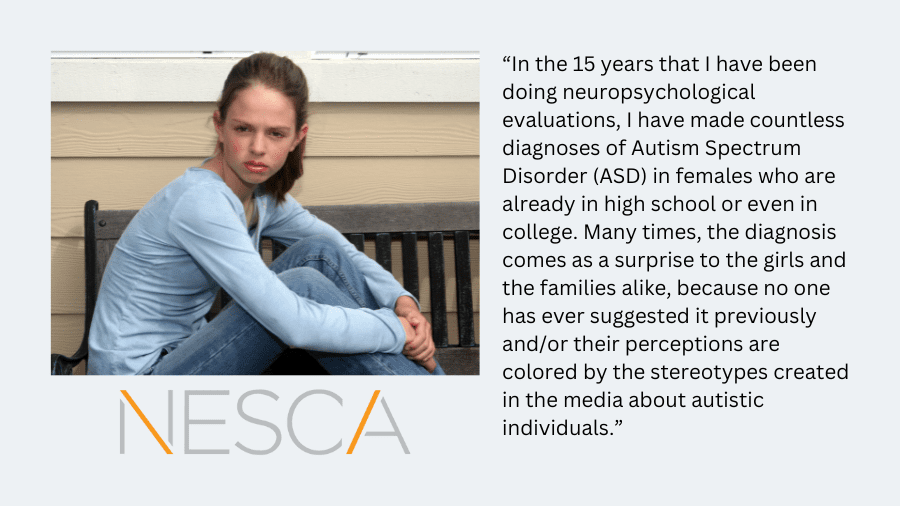
 By: Lauren Halladay, Ph.D.
By: Lauren Halladay, Ph.D.
Pediatric Neuropsychologist, NESCA
Children with Attention Deficit-Hyperactivity Disorder (ADHD) often struggle to sustain attention, follow directions, and appropriately interact with peers when compared to children with typical development. Executive functioning challenges, including difficulties with self-regulation, are also common in individuals with ADHD. Executive functioning refers to the neuropsychological-based functions involved in the regulation of behavioral states and the organization of goal-directed behavior. This can present as difficulty breaking down goals into steps, planning, monitoring the effectiveness of an approach to a task, modulating one’s emotions, etc.
Currently, evidence-based treatment methods for managing ADHD symptomology include medication, behavioral interventions, or the combination of the two. In addition, one domain that has received increased attention from the scientific community over the past several years is the integration of mindfulness-based interventions (MBI) within treatment (Felver & Jennings, 2016).
Mindfulness is the ability to bring one’s attention to experiences occurring in the present moment, which can allow an individual to consider alternative ways to perceive and react to a situation (Singh et al., 2007). Many MBI curriculums include lessons on focusing one’s attention on the present moment, which can improve individuals’ self-regulation, executive functioning, concentration, and emotional-reactivity, while reducing aggressive behavior, social problems, and anxiety (Keng et al., 2011; Parker et al., 2014).
One such curriculum, originally developed for adults with Intellectual Disabilities and aggressive behaviors, is Soles of the Feet (SoF) (Singh et al., 2003). The purpose of this exercise is to shift the individual’s attention from a typically triggering situation to a neutral stimulus. The SoF intervention involves teaching an individual to recognize situations that trigger an emotional response in real life or through role-play scenarios. Next, the individual is guided through steps in the curriculum that consist of finding a neutral body posture, breathing naturally while thinking about the triggering event, and shifting attention to the soles of the feet. Then the individual is guided to be mindful of their feet on the ground. The goal is for the individual to end this process having appropriately responded to the situation without engaging in behavior that was contrary to expectations. Research suggests that engaging in this intervention significantly improved participants’ ability to regulate their aggressive and disruptive behaviors, and appropriately engage with others (Felver et al., 2013; Singh et al., 2007).
There are several mindfulness-based activities, such as progressive muscle relaxation and focusing on your five senses, that can be modified to support children’s attentional and emotional regulation. For some ideas, please consider visiting the American Psychological Association (APA)’s Magination Press website, where they offer several children’s book titles related to a variety of topics, including mindfulness.
References
Felver, J. C., Doerner, E., Jones, J., Kaye, N., & Merrell, K. M. (2013). Mindfulness in school psychology: Applications for intervention and research. Psychology in the Schools, 50, 531–547
Felver, J. C., Celis-DeHoyos, C., Tezanos, K., & Singh, N. N. (2016) A systematic review of mindfulness-based interventions for youth in school settings. Mindfulness. doi:10.1007/s12671-015-0389-4
Keng, S. L., Smoski, M. J., & Robins, C. J. (2011). Effects of mindfulness on psychological health: a review of empirical studies. Clinical Psychology Review, 31(6), 1041-56.
Parker, A. E., Kupersmidt, J. B., Mathis, E. T., Scull, T. M., & Sims, C. (2014). The impact of Mindfulness education on elementary school students: evaluation of the Master Mind program. Advances in School Mental Health Promotion, 7(3), 184-204. doi:10.1080/1754730x.2014.916497
Singh, N. N., Wahler, R. G., Winton, Adkins, A. D., Myers, R. E., & The Mindfulness Research Group. (2003). Soles of the feet: A mindfulness based self-control intervention for aggression by an individual with mild mental retardation and mental illness. Research in Developmental Disabilities, 24, 158–169.
Singh, N. N., Lancioni, G. E., Winton, A. S. W., Singh, J., Curtis, W. J., Wahler, R. G., & McAleavey, K. M. (2007). Mindful parenting decreases aggression and increases social behavior in children with developmental disabilities. Behavior Modification, 31(6), 749-771. doi:10.1177/0145445507300924
About Lauren Halladay, Ph.D.
Dr. Halladay conducts comprehensive evaluations of toddlers, preschoolers, and school-aged children with a wide range of developmental, behavioral, and emotional concerns. She particularly enjoys working with individuals with Autism Spectrum Disorder, Intellectual and Developmental Disabilities, and complex medical conditions. She has experience working in schools, as well as outpatient and inpatient hospital settings. She is passionate about optimizing outcomes for children with neurodevelopmental disabilities by providing evidence-based, family-oriented care.
If you are interested in booking an appointment for an evaluation with a Dr. Halladay or another NESCA neuropsychologist/clinician, please fill out and submit our online intake form.
NESCA is a pediatric neuropsychology practice and integrative treatment center with offices in Newton, Plainville, and Hingham, Massachusetts; Londonderry, New Hampshire; the greater Burlington, Vermont region; and Brooklyn, New York (coaching services only) serving clients from infancy through young adulthood and their families. For more information, please email info@nesca-newton.com or call 617-658-9800.



 from elementary school through young adulthood. In addition to direct client work, Ms. Badamo provides consultation and support to parents and families in order to help change dynamics within the household and/or support the special education processes for students struggling with executive dysfunction. She also provides expert consultation to educators, special educators and related professionals.
from elementary school through young adulthood. In addition to direct client work, Ms. Badamo provides consultation and support to parents and families in order to help change dynamics within the household and/or support the special education processes for students struggling with executive dysfunction. She also provides expert consultation to educators, special educators and related professionals.


 attention deficit disorders, communication disorders, intellectual disabilities, and learning disabilities. She particularly enjoys working with children and their families who have concerns regarding an autism spectrum disorder. Dr. Milana has received specialized training on the administration of the Autism Diagnostic Observation Schedule (ADOS).
attention deficit disorders, communication disorders, intellectual disabilities, and learning disabilities. She particularly enjoys working with children and their families who have concerns regarding an autism spectrum disorder. Dr. Milana has received specialized training on the administration of the Autism Diagnostic Observation Schedule (ADOS).
 meaningful skills in order to reach their goals. She has spent the majority of her career working in a private school for students with ASD. She has also spent some time working in an inpatient mental health setting. Lyndsay uses occupation-based interventions and strategies to develop life skills, executive functioning, and emotional regulation. While completely her doctoral degree at MGH Institute of Health Professions, Lyndsay worked with the Boston Center for Independent Living to evaluate transition age services. She uses the results from her research to deliver services in a way that is most beneficial for clients. Specifically, she focuses on hands-on, occupation-based learning that is tailored the client’s goals and interests.
meaningful skills in order to reach their goals. She has spent the majority of her career working in a private school for students with ASD. She has also spent some time working in an inpatient mental health setting. Lyndsay uses occupation-based interventions and strategies to develop life skills, executive functioning, and emotional regulation. While completely her doctoral degree at MGH Institute of Health Professions, Lyndsay worked with the Boston Center for Independent Living to evaluate transition age services. She uses the results from her research to deliver services in a way that is most beneficial for clients. Specifically, she focuses on hands-on, occupation-based learning that is tailored the client’s goals and interests.


 unique pattern of strengths and weaknesses to best formulate a plan for intervention and success. With experiences providing therapy and assessments, Dr. Creedon bridges the gap between testing data and therapeutic services to develop a clear roadmap for change and deeper of understanding of individual needs.
unique pattern of strengths and weaknesses to best formulate a plan for intervention and success. With experiences providing therapy and assessments, Dr. Creedon bridges the gap between testing data and therapeutic services to develop a clear roadmap for change and deeper of understanding of individual needs.


 staff at Johns Hopkins University and trained at the University of California, Los Angeles (UCLA). She provides comprehensive neuropsychological evaluations of children, adolescents, and young adults who have learning, behavioral, and socio-emotional challenges. Her areas of expertise include Autism Spectrum Disorder and other conditions that usually co-occur with this diagnosis; Attention-Deficit/Hyperactivity Disorder; Dyslexia and other Specific Learning Disabilities; and Anxiety/Depression. She thinks that the best part of being a pediatric neuropsychologist is helping change the trajectory of children’s lives.
staff at Johns Hopkins University and trained at the University of California, Los Angeles (UCLA). She provides comprehensive neuropsychological evaluations of children, adolescents, and young adults who have learning, behavioral, and socio-emotional challenges. Her areas of expertise include Autism Spectrum Disorder and other conditions that usually co-occur with this diagnosis; Attention-Deficit/Hyperactivity Disorder; Dyslexia and other Specific Learning Disabilities; and Anxiety/Depression. She thinks that the best part of being a pediatric neuropsychologist is helping change the trajectory of children’s lives.
 extensive experience working with children and adolescents with a range of learning and social/emotional abilities. Kristen’s strengths lie in her communication and advocacy skills as well as her strengths-based approach. She is passionate about developing students’ self-awareness, goal-setting abilities, and vision through student-centered counseling, psychoeducation, social skills instruction, and executive functioning coaching. Mrs. Simon has particular interests working with children and adolescents on the Autism spectrum as well as individuals working to manage stress or anxiety-related challenges.
extensive experience working with children and adolescents with a range of learning and social/emotional abilities. Kristen’s strengths lie in her communication and advocacy skills as well as her strengths-based approach. She is passionate about developing students’ self-awareness, goal-setting abilities, and vision through student-centered counseling, psychoeducation, social skills instruction, and executive functioning coaching. Mrs. Simon has particular interests working with children and adolescents on the Autism spectrum as well as individuals working to manage stress or anxiety-related challenges.
Connect with Us